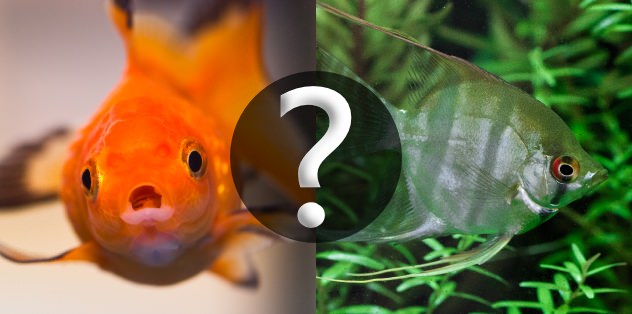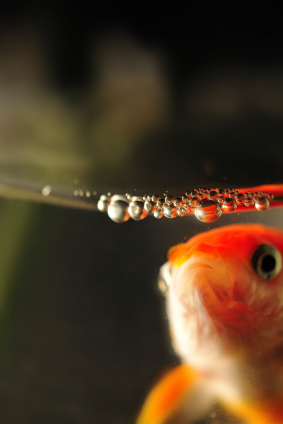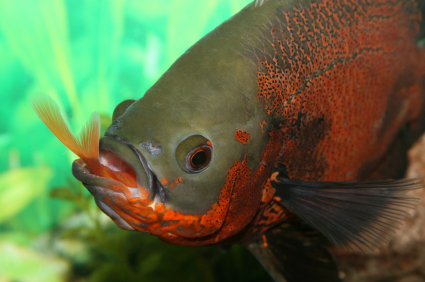
Can you meet the needs of goldfish and tropical fish in the same aquarium? Or is this just a recipe for disaster?
Your betta is lonely, so you add two goldfish to keep him company. Or maybe you already have a goldfish tank set up, and you’re planning to buy neon tetras for a little more variety.
But can goldfish and tropical fish really thrive together in one tank?
After all, you don’t want to subject your goldfish to more stress than they can handle. Or worse, come home to find satisfied and bulging bellies but no goldfish to be seen!
For some pet owners, goldfish get along fine with tropical fish. Others have tried relentlessly to keep their goldfish in a tropical environment, only to discover fish go missing, torn fins, disease outbreaks, and a number of other problems – all problems that could have been prevented if their goldfish had their own separate tank.
So what’s going on?
Are Goldfish and Tropical Fish Compatible?
In short, no.
I definitely wouldn’t recommend keeping goldfish with tropical fish, and I know several fish hobbyists who wouldn’t either. Goldfish aren’t tropical.
It isn’t just a matter of how goldfish get along with other tropical fish. Goldfish and tropical fish have different requirements and to meet both requirements in one tank is just impossible. You can’t do it. You might come close, but you can’t give your fish all of the recommended goldfish care they need in a tropical aquarium.
You’ll have to make compromises to keep both your goldfish and tropical fish happy.
- Maybe you can’t give your goldfish a complete nutritional diet because you also have to meet the needs of your tropical fish.
- Maybe you can’t provide your goldfish with a powerful enough filter to reduce waste and maintain high oxygen levels because the water flow would irritate sensitive tank mates.
- Or maybe you can’t maintain the comfortable temperature conditions your goldfish prefer because your tropical fish are too sensitive to cooler temperatures.
If you’ve been keeping goldfish and tropical fish together for years, you might think this article doesn’t apply to you.
Think again. Your fish appear to be getting along fine, but what’s really happening in the aquarium that you don’t know about?
8 Reasons Why You Shouldn’t Mix Goldfish and Tropical Fish

- Goldfish and tropical fish have different temperature requirements. Goldfish – coldwater fish – prefer cooler temperatures around 65°F (18°C), while tropical species like their water toasty warm (72 to 85°F or 22 to 29°C). Yes, a goldfish can stand warmer temperatures temporarily (when they’re kept in a pond during summer months). But they won’t feel comfortable kept in warm water all the time. And if you try keeping tropical fish in cold water, they’ll just become lethargic and refuse to eat. One of the many benefits of keeping goldfish is that they don’t need a heater; most tropical tanks do.
- Goldfish and tropical fish have different temperaments. Goldfish are peaceful, while many tropical fish can get very aggressive. Some fancy goldfish varieties also have long, flowing fins that other tropical species love nipping on. Since goldfish are rarely ever aggressive, it’s not uncommon for several smaller fish to bully larger goldfish. And if you have territorial fish in the aquarium (angelfish, for example), it’ll be a living nightmare for your goldfish. Your goldfish could become seriously hurt or even killed.
- Goldfish and tropical fish have different disease tolerances. Some diseases affect fish differently. Since tropical fish are a completely different species, there’s a good possibility that your goldfish will get sick from a disease that won’t necessarily impact your tropical fish. Goldfish also get diseases more readily under warmer temperatures than they would under cooler, more comfortable temperatures.
- Goldfish and tropical fish have different diets. Without the right nutrients, your goldfish may not thrive. Many may even become malnourished, which can lead to all sorts of goldfish diseases. Goldfish require more fiber-rich foods in their diet to prevent constipation (very common in fancy varieties). Young and fancy goldfish also require protein-rich foods to develop and grow. To top that off, goldfish are primarily plant-based and so need plenty of veggies. Since goldfish don’t have “true” stomachs, they often run into digestion problems. Tropical food is harder for goldfish to digest than food specially formulated for goldfish.
- Goldfish are ravenous eaters. Goldfish won’t think twice before gobbling up every morsel of food you drop into the tank – and greedily pushing aside slower fish that stand in their way. Unlike bettas, goldfish aren’t picky at all. And because they feed so quickly and thoroughly, some tropical fish (especially the smaller ones) won’t stand a chance during feeding time.
- Goldfish are messy. Goldfish excrete lots of waste that can quickly pollute a smaller aquarium (which is why they’re kept in large tanks). Most tropical fish don’t need the extra space goldfish do and so are usually content in smaller aquariums. And because many tropical tanks have filtration systems that can’t keep up with the high levels of waste your goldfish excrete, you’ll soon find yourself with devastating and dangerous ammonia spikes that can cause serious problems – even killing your fish.
- Goldfish are very large compared to many tropical fish species. Most fancy goldfish varieties grow up to 6 or 7 inches long (15 or 18 centimeters), while common and comet goldfish can grow to a foot long (30 centimeters) and even more. Though there are exceptions, tropical fish tend to stay small. By the time your goldfish reach adulthood, your tropical fish may turn into tasty snacks.
- Goldfish love the company of other goldfish. While goldfish don’t form very tight schools like neon tetras, they are still quite social and like to be around other goldfish. In fact, you may notice that your goldfish stick together and will often follow one another around the aquarium. Even so, certain goldfish varieties still shouldn’t be mixed; goldfish do best when they’re with other goldfish similar in size and shape.
Still in Doubt?

Think about this: You wouldn’t go to the beach on a hot summer’s day in a winter coat. And why would you? You’d be much too warm, sweaty, and very stressed out.
Putting your goldfish in a tropical aquarium is going against their nature.
Just like you wouldn’t feel comfortable wearing a coat in 80-degree weather, your goldfish could go through all kinds of stress in a tropical aquarium. And shouldn’t you provide goldfish with an aquarium habitat as close to their natural environment as possible? After all, you don’t want the hassles of sick or lethargic fish.
It’s ultimately up to you whether to mix goldfish with tropical fish, but remember: Your goldfish depend on you for their care. If you want happy, healthy fish with vibrant colors and long-lasting lives, you’ll think twice before throwing goldfish into a tropical tank.
So What Do You Think?
Should you mix goldfish and tropical fish together? Should goldfish care be compromised to satisfy tropical fish needs? Or should goldfish be kept in separate tanks with other coldwater fish?
Join the debate! Add your thoughts, feedback, and goldfish care tips to the comments below.



27 comments
Ok, so I’ve had comet gold fish with my “feeder” guppies and 2 rainbow sharks and they seem to be doing fine. The only thing is I have to change the tank water a little more often, since there are goldfish in there. But all in all they seem to be doing fine and thriving just as well.
Hi there!
Depending on the tropical fish being grouped with your goldfish, sometimes you’ll experience negative results and at other times you won’t (as you mentioned). But ideally, you’ll want to keep your goldfish in a separate aquarium with other goldfish of the same type. Yes, it is possible to have goldfish live many years in a tropical tank, but it isn’t ideal. And some people do run into problems when keeping goldfish together with tropical fish (though this isn’t always the case).
Thanks for dropping by! 🙂
Christina
i think that its helpful
Thanks Vernon! I’m glad you found the information useful.
Okay, I was considering getting a goldfish for my tropical fish tank but, I am convinced otherwise now. I have done it before but, DON’T plan on doing it agian… Thanks, this really opened my eyes.
Thanks Sarah! I’m glad you found this article useful. Goldfish are bulky little fellows and can create more waste than you bargained for. It’s best to separate these ammonia builders so your other tropical fish can thrive. Besides, depending on your fish, you’ll be able to keep more tropical fish in your tank than you would if you introduced a goldfish.
Cheers!
I agree to a certain extent. Some tropical fish can tolerate living with goldfish, and handle the same temp and diet. For example, I have two Orandas and 2 Siamese Algae Eaters thriving and growing in my 50 g. My house temp thus my tank temp says at 72 in winter, and 79 in summer. Both Orandas can handle 72-85 degrees, while SAEs can go to 72-85 degrees.
While I agree, I researched the best fish to go with the Orandas. Saes are calm, and social. They can handle a wide range of PH like Orandas, and my fish are all healthy and growing very large. SAEs grow to almost 7 inches and so do Orandas and larger. No risk of cannibalism. I would not try this with any other fish, but I did the research and it’s paying off. Ultimately you have to do the work before you venture into anything, but if you can find a happy medium everyone is happy.
I agree, L. It’s best to do your research before venturing into the unknown. I’m glad this mix of tropical fish and goldfish has worked for you. There are some tropicals with temperate personalities that won’t bother goldfish dropped in the tank, while there are others that will pick on your goldfish unceasingly.
I once had an African Dwarf frog that I kept as a pet during college. When I went home for break, I dropped him in a tank with my betta. I did my research and read that some bettas tolerate frogs. And since they were both tropical, I figured why not? Sadly, my betta went after the frog right away, flaring its gills the whole while. My frog was forced to hide under a treasure chest ornament, and I was able to get him out before the betta could hurt him. I’m not sure what caused my betta to act that way (it could have been the webbed feet!), but it certainly gave me a fright.
This just goes to show that even research can backfire on you – but I made sure to watch the two closely before stepping away from the aquarium. If I hadn’t of been so attentive, my frog could have been betta food. So it’s always, always, important to stay attentive and research as much as you can before introducing two species together in one tank. If your fish get along, that’s great! But if not, it’s better to be there before accidents happen.
At the time of this comment things were going well, mostly because my SAEs were smaller fry. I had to remove them once they got too large, they were nipping my Orandas tail fins and just harassing them. It did not work out. I treated the Orandas so they would not get an infection and bought a new tank for my SAEs and built a tropical community around them, With danios, and many live plants. It’s not a large tank but they love it. I’m sorry mine didn’t work. It had been, but I guess those slow fins were just too much of a temptation. It did take a while for them to turn though.
i have had goldfish in with my tropical fish for months they are all happy as anything and the goldfish are healthy and swimming around all the time as are th tropical …. im sure its a risk but i dont think its a shouldnt because myn seem fine..
Thanks for letting us know your experiences, Tash! I agree that there are some tropical fish that seem to get along well with goldfish. You just need to keep a close eye on water quality and how each fish interacts with one another. While goldfish do prefer the colder temperatures, they can get by in warmer temps. It isn’t ideal, but they can stay healthy this way with a watchful eye and constant love and attention.
Hi, I have 2 comet goldfish in a 10 gallon tank and was debating on putting some guppies, an african dwarf frog or some mystery snails in with them but am on a tight budget… Any thoughts what I should do?
Shakkai, comets are known to be great pond fish because of the fact that they need lots of water to stay healthy. I wouldn’t recommend any pond fish to stay in a 10-gallon aquarium, let alone two! It could be fine during the early stages, before your fish reach maturity. But you should definitely try to upgrade as soon as possible. 🙂
I would recommend a 40-gallon aquarium at the very minimum for two comets. Until you can upgrade your aquarium, keep a close eye on water quality! Continue to do your water tests and make sure ammonia and pH levels stay under control. Once those two comets get bigger, they’re going to be excreting a lot of waste! Water changes should be paramount on your to-do list until you can get a bigger tank, especially if you notice any sudden spikes when you do the water tests. Make sure your power filter is in good working order as well! And if you plan to keep your fish in the 10-gallon for any long length of time, get an additional underground filtration system for your fish – they’ll need the extra oxygen. Some aquarium ornaments also offer additional aeration with airstones hidden within the ornament.
As for keeping other aquatic pets in with your goldfish, I really wouldn’t recommend introducing any more pets until you at least get a bigger tank. And when you do, definitely don’t put snails in the aquarium! Some goldfish can get along with snails but many will view your snails as tasty snacks.
Once you can upgrade your tank, you can set up an additional tropical tank with the 10-gallon and keep guppies, African dwarf frogs, and mystery snails together in one tank. I have a similar setup with neon tetras and they get along very well.
I have 3 medium sized goldfish and I’ve had them for 3 years. We just added to small tetras and it doesn’t look like things are going well. First, the water has become very cloudy. Second all the fish are now sitting at the bottom of the tank, not moving around too much except for feeding time. They are all eating-but then they go sitting at the bottom of the tank. Please advise me what I am doing wrong? Should I remove the tetras and place them in a separate tank? The goldfish almost seem traumatized. Thank you.
Rita, it sounds like your fish have fallen ill. What size aquarium do you have and when is the last time you’ve done a water test? If you haven’t tested the water yet, I would recommend buying a freshwater aquarium test kit. I personally use the API Freshwater Master Kit for all my tanks, and it’s never let me down yet.
Depending on your tank size, it sounds like you might have an overcrowding problem. Ammonia and pH spikes can be very harmful. You should also test the Nitrate and Nitrite levels. If ammonia levels are high, do immediate water changes (about 25% of the aquarium water every couple of days) and make sure your power filter is working properly. Reducing feeding can also make a difference in an overcrowded aquarium, at least until you can upgrade your tank. If you need to, there are water conditioners in stores that will help lower ammonia.
There also could be a chance that your tetras might have picked up something on the way home and the disease was transmitted onto your fish. It’s always important to have a quarantine tank for this reason – you can keep new fish in the tank for a couple weeks, ensuring that they stay healthy and no upcoming problems arise, before introducing them to your other fish. This way, you catch any illnesses before they affect the fish in your main aquarium. New fish are generally stressed from handling, and this stress often results in a lower immune system that can introduce them to a number of diseases that will make them sick. It’s better to play it safe with a quarantine tank before introducing your fish (and any diseases they might have picked up) right away to your main tank. So if the new fish does catch a disease, you can treat them quickly without worrying about your other fish getting sick.
I have had 3 medium sized goldfish in a 20 gallon aquarium. I just added 2 small tetras and things have gone wrong. The water is very cloudy and can’t seem to clear it up. Also, all the fish are sitting at the bottom of the tank and barely moving around. They ARE eating but go to the bottom of the tank directly after eating. What am I doing wrong? Should the tetras be placed in a separate tank?
I just purchased a gold fish to go in my tropical aquariam with a Betta fish in it and now that I have read this artical I am fearful for my gold fish and thinking of turning my heater off but then my Betta fish will suffe of the tempiture to any advice on what I should do and I can’t buy another aquariam I’m on a budget.
Hi Justine,
A long time ago, I tried keeping a betta in with my goldfish and he wasn’t very happy. Goldfish need strong power filters to manage all that waste they excrete, and the power filter alone can be very stressful for your betta. Bettas can’t swim very well with a power filter in the aquarium, especially one that doesn’t have any control over the water flow – they prefer very light currents.
The good news is that bettas don’t need a lot of space. You can drop him in a three-gallon aquarium for now with a small filter setup that either has a way to manage the water flow or continually keeps a low current. Three-gallon aquariums also aren’t very pricey. You can get one for about $20, depending on where you shop.
A problem you might have with this setup is keeping the water temperatures stable. It’s harder to manage temperatures in smaller aquariums. It could also be more difficult to complete the water changes, since you don’t want to change too much water and risk stressing out your betta. Keep a thermometer on the aquarium so you can constantly monitor the temperature and make sure you have a heater plugged in for those cold winters!
Hello I have a question I went to Walmart and got a pink and green neon tropical fish they are tiny and I want to put my goldfish with them but I’m pretty scared
Hi Meg,
I wouldn’t recommend it, especially since many smaller tropical fish are small enough to fit a fully grown goldfish’s mouth! Goldfish are omnivores and while they can be sweet, I don’t think I’d ever trust them around my neon tetras. You’re better off keeping them separated.
Thanks that was a very helpful post! But I have to disagree, I have been keeping goldfish( bottem feeders) and neon tettras AND guppys together. And i have not had on problem yet, there all a big happy bunch. The thing I did think about is, I am just feeding them all goldfish flakes.
Hi Jera – It definitely depends on the personalities of your fish. I’m glad your tropical mix has been working for you! Keep in mind though that guppies and goldfish both have different nutritional needs, so guppies might be better off with tropical food in their diet.
I guess some certin fish are happy with each other even if the rest of the species are not.
christina, I wanted to ask you a general question. Is cooler water less likely to cause disease. I have heard certain diseases can’t survive in cooler waters.
Hi Dilon,
The life cycles of some parasites will slow down in cooler temperatures, though that doesn’t mean your goldfish won’t get infected by these parasites. It will just take longer before you notice the infection, though the parasites will still be there. It will also take even longer to completely treat the parasites if you don’t first raise the water temperature to speed up the life cycle.
It is possible that some diseases have built resistance to warmer temperatures. Then again, some infections have also built resistance to cooler temperatures. Goldfish definitely prefer water temperatures around 65-70°F, and some goldfish might experience stress if left in very warm water temperatures for extended periods of time (longer than 3 – 4 months). This stress might make your goldfish vulnerable to disease.
Though the same would apply to goldfish left in very cool temperatures (below 55°F) for extended periods. In fact, goldfish will often hibernate in temperatures below 55°F. This allows pond fish to survive through winter months, though some fish hobbyists still like to bring their goldfish indoors if the weather gets very cold.
It’s better instead to create a balance. Preferably, avoid both very cool and very warm water temperatures if you’re keeping fancy goldfish in an aquarium. For pond fish, other measures are usually taken to ensure that the water doesn’t become unbearable and ice doesn’t completely cover the surface.
Usually though, if you’re maintaining healthy water conditions, feeding your goldfish a nutritious diet, and monitoring water parameters on a regular basis, you likely won’t run into problems. Infections usually only develop when goldfish are under stress. It’s very uncommon for healthy goldfish to get sick if you’re maintaining quality water conditions and taking safety precautions (like quarantining new fish).
Is Rainbow shark a tropical variety of fish???
Hi Sandhya,
I do believe rainbow sharks are tropical. They require warmer water temperatures than goldfish – 72 to 82°F(22°C to 28°C), whereas most goldfish prefer temperatures around 65°F(18°C).